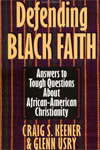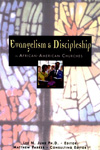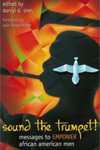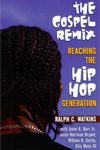|
EVANGELISM SUNDAY
LECTIONARY COMMENTARY
Sunday, August 26, 2012
Andrew Wilkes, Guest Lectionary Commentator
Affiliate Minister, Greater Allen A.M.E. Cathedral of New York and Faith and Community Relations associate, Habitat for Humanity, New York City
Lection – Ezekiel 2:1-7 (New Revised Standard Version)
(v. 1) He said to me: O mortal, stand up on your feet, and I will speak with you. (v. 2) And when he spoke to me, a spirit entered into me and set me on my feet; and I heard him speaking to me. (v. 3) He said to me, Mortal, I am sending you to the people of Israel, to a nation of rebels who have rebelled against me; they and their ancestors have transgressed against me to this very day. (v. 4) The descendants are impudent and stubborn. I am sending you to them, and you shall say to them, “Thus says the Lord God.” (v. 5) Whether they hear or refuse to hear (for they are a rebellious house), they shall know that there has been a prophet among them. (v. 6) And you, O mortal, do not be afraid of them, and do not be afraid of their words, though briers and thorns surround you and you live among scorpions; do not be afraid of their words, and do not be dismayed at their looks, for they are a rebellious house. (v. 7) You shall speak my words to them, whether they hear or refuse to hear; for they are a rebellious house.
I. Description of the Liturgical Moment
Evangelism Sunday is an important ritual—hallowed by tradition, reason, and the church’s mission—that sets aside a worship service to accent the importance of inviting individuals within our families, professional circles, and social networks to follow Jesus Christ as Lord and Savior. For African Americans, evangelism is about embodying the invitational thrust of the words to the song “Jesus, the Light of the World”: “We’ll walk in the light, beautiful light. Come where the dew-drops of mercy shine right.”1 Evangelism is also about “the taste and see moment”2—that luminous point where the richness of our worship spills over into our witness, prompting us to tell our neighbors about God’s grace in Christ.
Evangelism derives its meaning from the word evangel, which simply means good news or glad tidings.3 Evangelism rests upon God’s summons to speak a divine word, a mandate which occasionally brings us before hostile audiences or transitions into awkward conversations. Nevertheless, giving voice to our faith and matching words to God’s utterances is a theological and moral imperative.
II. Biblical Interpretation for Preaching and Worship: Ezekiel 2:1-7
Part One: The Contemporary Contexts of the Interpreter
I recently traveled to Washington, D.C. to advocate for public investment in affordable housing and national service programs. After a day of lobbying visits, I took an evening stroll back to the hotel. While walking, a bus breezed by with a sign that read: “Doubts about religion? You’re one of many.” Somewhat startled, I continued, discovering that African Americans for Humanism had produced the advertisement. The ad, which is part of a national campaign, symbolizes the reality that African American communities are not monolithic: numerous theological and philosophical perspectives are advanced within our salons, our historically black colleges and universities, and other social spaces. Moreover, consumer markets that associate African Americans with some version of Christian faith—think Tyler Perry movies, BET’s Celebration of Gospel show, and so on—can unintentionally lead us to depreciate the importance of evangelism.
Increasingly visible campaigns to abandon faith and market-driven invocations of faith are a joint summons for us to speak a divine word of living faith in fresh and exciting ways. The preaching moment can thrive in this contemporary period of contrasting viewpoints, but only if we redouble our efforts to offer a clear and compelling answer for the Christian hope that lies within us.
Part Two: Biblical Commentary
Ezekiel prophesied between 594 and 571 B.C.E., receiving his call around the age of thirty.4 Of particular note, the Babylonian Exile of 586 B.C.E. occurred during Ezekiel’s storied career and represents one of the important backdrops of our focal text. Part b of verse three reads ominously—“they and their ancestors have transgressed against me to this very day”—perhaps functioning as a rationale for exile. The structure of the text can be split into two parts: Ezekiel’s commission (vv. 1-5); and the subsequent admonition against fear (vv. 6-7).
Two other dimensions of the text, however, merit mentioning. First, the prophet is instructed to stand up (v. 1), and in what appears to be a related message, is set on his feet (v. 2). Second, a spirit that enters Ezekiel apparently causes him to listen and be attentive to his divine call. This standing, setting, and listening underscore an important point: a proper reception of a vision from God prepares us for a vocation of proclaiming the Lord’s word. Next, note that assurance of a divine mission (vv. 3-4)—that is, Ezekiel using his own words to express God’s words (v. 7)—appears to be the theological theme that enables Ezekiel to overcome his fear and anxiety. We find, in verse six alone, a fourfold refrain to resist the debilitating consequences of fear and dismay. The phrase “do not be afraid” occurs three times; the phrase “do not be dismayed,” once. Anxiety and trepidation are often infused with the desire to give voice to our faith. Relying on a calm yet confident knowledge that we are sent by God does not expel trepidation, but empowers us to act despite it. Unfortunately, too often these days, trepidation or perhaps disinterest have prevailed in the Church. Very few are evangelizing.
Speaking the Lord’s message whether the people of Israel listen or not is a subtheme in our passage, a part of Ezekiel’s commissioning. Israel is described rather harshly—a nation of rebels (v. 3), impudent and stubborn (v. 4), a rebellious house (v. 5), and least flattering, briers, thorns, and scorpions (v. 6). Nevertheless, God deputizes Ezekiel to utter “Thus says the Lord God” (v. 4) to a hostile audience. Given the description of Israel here, we can safely assume that many families and individuals did not hear and/or heed his message. Yet the charge to proclaim remains. We speak because we are sent—“Mortal, I am sending you to the people of Israel” (v. 3)—and being obedient to God’s charge is our primary motivation. Notice that Ezekiel is promised neither the allure of a receptive response nor the dread of a resistant one. His task instead is to speak God’s word with such power and persuasion that it is indisputably clear, even to a rebellious house, that “there has been a prophet among them” (v. 5).
In the words of Brian Blount, president of Union Theological Seminary in Virginia, space matters. It is important that God’s word is preached among us, not simply to or about us (v. 5). Mark Jefferson references Kanye West and Jay-Z’s provocative song “No Church in the Wild” to make this point. He argues that the wild is both within and beyond the walls of black churches, pinpointing unchurched audiences, such as millennials (those born after 1980), as an important demographic that the Church often underserves.5 Moreover, he perceptively notes that many clergy, mission teams, and other would-be evangelists fail to proclaim the glad tidings of the Gospel in the wild. One reason for this neglect is that we sometimes presume that “the wild” is a rebellious place where our message will not be welcome. Consequently, we forget that prophets are still called and commissioned to utter a word of faith, hope, and love on behalf of God Almighty, even in the wild. To use an agricultural metaphor, the Gardener dispatches us to plant seeds—regardless of whether or not we believe our seeds will grow. And prophets are not the only one who are dispatched; all believers are obligated to plant seeds.
Challenge
Clergy and laity alike, you can do at least two things: share a personal story with a friend about how Christ transforms your life, and invite a colleague or friend to attend church. While I cannot promise success, you may help ignite and revive faith in “the wild”—among audiences where a divine word has not been spoken “among them” in recent memory or not in ways that they could hear.
Descriptive Details
The descriptive details in our passage include the following elements:
Sights: Blank stares, furrowed brows, and cold glares suggested by the following phrase—“Do not be dismayed at their looks, for they are a rebellious house” (v. 6);
Sounds: Ezekiel recounting God’s call to him to evangelize; and
Touch/Textures: The piercing sting of scorpions, prickly briars, and sharp thorns (v. 6).
III. Other Sermonic Comments or Suggestions
The following resources may prove useful as you prepare to cover the topic of evangelism in the sermonic moment. I commend them to you—use them as you find necessary but always keep in mind the distinctive needs, hopes, and concerns of your congregation or audience.
- The Root.com. “On Black Atheism,” a seven-part interview series on the topic of black atheism.
Online location: http://www.theroot.com/category/views-tags/black-atheism-0
-
Why I Believe There Is a God: An Anthology of Inspirational Essays with an Introduction by Dr. Howard Thurman. Chicago, IL: Johnson Publishing Co., 1965.
 |
Keener, Craig S. and Glenn Usry. Defending Black Faith: Answers to Tough Questions About African-American Christianity. Downers Grove, IL: Intervarsity Press, 1997. |
 |
Evans, James H., Jr. Edited and Introduced by Stephen G. Ray Jr. We Have Been Believers: An African American Systematic Theology, Second Edition. Minneapolis, MN: Fortress Press, 2012. |
 |
June, Lee N. and Matthew Parker, eds. Evangelism & Discipleship in African-American Churches. Grand Rapids, MI: Zondervan, 1999. |
 |
Sims, Darryl D., ed. Sound the Trumpet! Messages to Empower African American Men. Valley Forge, PA: Judson Press, 2003. |
 |
Watkins, Ralph C., et al. The Gospel Remix: Reaching the Hip Hop Generation. Valley Forge, PA: Judson Press, 2007. |
Notes
1. “Jesus, the Light of the World.” By George D. Elderkin; verses by Charles Wesley. African American Heritage Hymnal. Chicago, IL: GIA Publications, 2001. #217
2. Psalm 34:8.
3. Armstrong, Richard Stoll. “Evangelism.” The Westminster Dictionary of Christian Theology. Alan Richardson and John Bowden, eds. Louisville, KY: Westminster John Knox Press, 1983. p. 193.
4. Eichrodt, Walther. Ezekiel: A Commentary. Louisville, KY: Westminster John Knox Press, 1970. pp. 1, 193.
5. Jefferson, Mark A. “No Church in the Wild: Hip-Hop, Black Churches, and the Streets.”Online location: http://www.urbancusp.com/newspost/%E2%80%98no-church-in-the-wild%E2%80%99-black-churches-hip-hop-and-the-streets/ (accessed 21 January 2012).
|